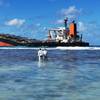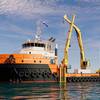Finally We Can Drill Off Florida's Coast! Right?
WRONG! With oil prices reaching record highs and declines in production showing everywhere, there has never been a time that we needed to explore and produce the vast reserves in the Eastern Outer-Continental Shelf. President Bush ordered the lifting of the White House ban on offshore drilling on June 14, 2008. Assuming that Congress does what it should do, and finally lifts the ban on offshore drilling along US Coasts, one would think that we would be set to drill away. However, there is a serious hump that we have to overcome in order to be able to explore the deep-water regions of the Outer Continental Shelf. We simply do not have enough offshore platforms, drill-ships and rigs to do the job.
The drill ships that are currently built are not available, and will not be for some time. Some industry executives suspect that the existing ships are booked for the next 5 years. Most of these ships have been booked by large Nationalized oil companies, and are working off the coast of South America, Asia and other foreign countries that allow the exploration of their natural resources. What do American exploration companies do when they have leases, but do not have the rigs to explore those leases? Nothing and Congressional opponents to lifting the drilling bans have argued time and time again: there are 1000's of acres that are currently being leased and are not being explored. Congress suggests that it is a lack of desire or maybe greediness that keeps companies from exploring these leases. At no time, did Congress say that because of their policies, the offshore platforms and drill ships are working elsewhere.
The lack of offshore rigs can be felt everywhere. Record prices are being paid for the rigs that are in operation, its simple supply and demand. One company just received a contract for over $600,000/day for an offshore platform in the Gulf of Mexico, that's an increase of 500% since 2002. If a company wanted to outright purchase an offshore platform, that would cost them about $500 million. That is an increase of about $100 million since last year, and there's no reason to think that this price is not going to continue to climb. With oil prices so high and large reserves in the Gulf it is still cost efficient to pay these high prices, but it will do nothing to lower the cost of oil in the short term.
With the shortage of drill ships, comes incredible opportunity. Companies are ramping up production of offshore platforms and drill ships. There are already 16 new drill ships scheduled to be delivered this year: more than double the amount shipped over the last six years combined. In fact, 75 ultra-deepwater rigs should be delivered from 2008 to 2011, according to ODS-Petrodata, a firm that tracks drilling rigs. But even then, the US is not situated to begin exploring off the coast of Florida. The rush to get into the Eastern OCS will be wild once the ban is finally lifted, assuming we can find the rigs.
The majority of the new orders are going to Asia, Africa, Australia and Brazil. These areas have already begun exploring their deepwater reserves, and are ready to actively pursue them. The Gulf of Mexico remains one of the most expensive places in the world to drill and the most highly regulated. Add to that the shortage of ships, and the fact that the US still doesn't want you to drill off of Florida, and its no surprise that the drill ships are not headed to the Gulf.
With the exception of ANWR, there is no place in the continental United States that has more untapped reserves than the Eastern OCS. Offshore technology has improved dramatically over the years. Oil spills are still possible, but have been reduced to almost nothing: so much in fact, that more oil seeps naturally from cracks in the ocean floors than is spilled from exploration, production and transportation. The US needs to open these waters and allow US companies to begin exploration.
So, what are we to do? Congress needs to act now. If we had acted 10 years ago and lifted the moratorium we would not be where we are now. As soon as we lift the moratorium, companies will ramp up their efforts in the Eastern OCS. This will encourage more production of rigs and drill ships. The companies that have been moving their resources to different areas of the world, will pull them back to the US and the Gulf to explore for the billion of barrels of oil that exist just off the coast of Florida.
About the author: Don serves as the President of Louisiana Oil & Gas Association (LOGA). LOGA represents exploration, producing and service sector companies operating in Louisiana. LOGA strives to make Louisiana a state where the oil and gas industry can prosper and enjoy the fruits of its hard work and at the same time be in harmony with the environment and state government.










